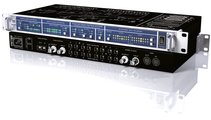This Multichannel Audio Digital Interface offers format conversion from MADI to ADAT and vice-versa. The ADI-648 thus combines the world's most successful multi-Channel interface with the professionals' exclusive high-end interface. MADI offers 64 channels of 24-Bit audio at up to 48 kHz sample rate, and 32 channels at up to 96 kHz. Transmission happens over a single line, either coaxial (BNC) or fiber optic (network). In both cases the cable length can be more than 100 meters.
The MADI channels are transferred from and to 8 ADAT optical inputs and 8 outputs via TOSLINK. Furthermore, the ADI-648 contains an easy-configurable 8-Channel 16x16 Matrix Router. Any of the outputs, which are divided into 8-Channel blocks, can be fed from any 8-Channel input block, both on the ADAT and the MADI side. With this, there is not only free routing within the M-A and the A-M conversion, but also splitting and routing within the same format. An 8-Channel input block can be routed to any number of output blocks in parallel. Using more than one unit, several MADI signals can be combined to one (merging). Here are some application examples:
- Managing long distances with a single cable
- ADAT breakout box for devices with MADI interface
- Connecting MADI-based equipment to RME's Hammerfall series
- ADAT optical patchbay and router
- MADI coaxial / optical or vice-versa converter and splitter
- MADI redistributor, patchbay and router
- MADI Merger
The ADI-648 is compatible to all forms of increasing the sample rate (Double Speed). It supplies word clock in single or double speed, distributes 96 kHz signals in Double Wire mode into the MADI data stream, or per Sample Split (S/MUX) to the ADAT ports, but is also capable of double MADI rate (96k Frame). The ADI-648 thus also represents an ideal MADI front-end for the Hammerfall and Hammerfall DSP series.
® and ®, technologies known from and proven by other RME products, allow for perfect sync between all channels and easy notification of error states. And of course multiple devices can be cascaded and synchronized sample-accurate using word clock. The ADI-648 accepts 56 channels, 64 channels and 96k frame at its input, and can be set to generate those formats at its output. This way the ADI-648 even serves as perfect interface between otherwise incompatible MADI devices!
The compact device with 19" width and 1HU has numerous further outstanding features, like and storing of the settings. It's even possible to transmit 16 MIDI channels in parallel to all 64 audio channels. A fully automatic input selection between optical and coaxial input offers a useful redundancy mode for critical applications. Extensive status displays give information about Lock and Sync states, audio content and the physical quality of the incoming signal.
Talking about clock: The ADI-648 includes SteadyClock(TM), a digitally controlled clock, especially developed by RME for MADI operation. It allows for operation without an additional word or AES clock line. The reference clock is extracted in highest quality from the MADI signal itself.
The rear of the ADI-648 looks clear and tidy. Eight ADAT optical inputs and outputs each, two MADI inputs and outputs each (coaxial, optical), word clock I/O (BNC) with switchable termination, and two DIN MIDI jacks offer unbeatable flexibility and compatibility.
The ADI-648 is compatible to MADI interfaces of companies like Sony, Merging, Lawo, Euphonix, Stagetec, Jünger, Audio Service, AMS and others.
The ADI-648 can be remote controlled completely via MIDI. Also all controls and LEDs on the front plate - the complete status - can be read via MIDI. Each ADI-648 can be programmed with its own ID, providing a separated remote control of multiple devices via a single MIDI channel.
The Windows software MIDI Remote can be downloaded for free from the RME website. It can use any existing MIDI port within the system to perform remote control and status requests of all ADI-648 via a simple mouse click. The software provides both a front-panel like operation (see above) and an extended Matrix display. Most appealing is the combination with a Hammerfall DSP(e) MADI, offering a direct control of the ADI-648 via MADI. The remote control software then uses a virtual MIDI port of the card that directly sends and receives MIDI data via MADI.
Schematic view
Input MADI: 1 x BNC, 1 x optical
Output MADI: 1 x BNC, 1 x optical
Input ADAT optical: 8 x TOSLINK, 24-Bit, Bitclock PLL
Output ADAT optical: 8 x TOSLINK, 24-Bit
Input word clock: BNC, Signal Adaptation Circuit (functional from 1.2 Vpp input signal), switchable termination
Output word clock: BNC, low-impedance driver stage, 4 Vpp into 75 Ohms, short-circuit-proof
MIDI input and output: via two 5-pin DIN jacks
Sync sources: MADI, ADAT optical, word clock, internal
Varipitch: by input signal or word clock
Sample rates: 44.1 kHz, 48 kHz, 88.2 kHz, 96 kHz, variable (Sync/word clock)
Sample rate range: MADI: 32 kHz - 96 kHz, word clock: 27 kHz-105 kHz, ADAT: 33 kHz - 57 kHz
Jitter: Internal clock < 1 ns, word clock In < 2 ns, ADAT In < 2 ns
Jitter suppression on external clock: circa 30 dB (2.4 kHz)
Jitter sensitivity: all PLLs operate even at 100 ns Jitter without problems
Power supply: internal switching mode ps, 100 V-240 V AC, 50-60 Hz, 10 Watts
Dimensions: 483 x 44 x 200 mm










